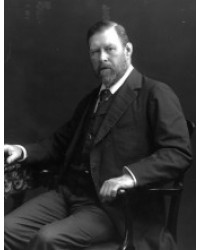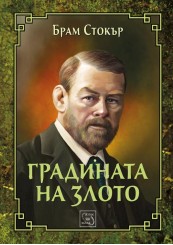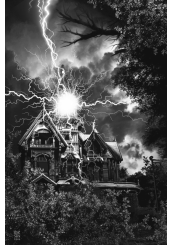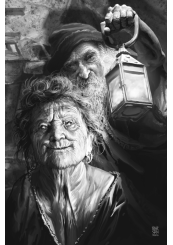Bram Stoker

Abraham "Bram" Stoker (8 November 1847 – 20 April 1912) was an Irish author, best known today for his 1897 Gothic novel Dracula. During his lifetime, he was better known as the personal assistant of actor Henry Irving and business manager of the Lyceum Theatre in London, which Irving owned.
Stoker was born on 8 November 1847 at 15 Marino Crescent, Clontarf, on the northside of Dublin, Ireland. His parents were Abraham Stoker (1799–1876) from Dublin and Charlotte Mathilda Blake Thornley (1818–1901), who was raised in County Sligo. Stoker was the third of seven children, the eldest of whom was Sir Thornley Stoker, 1st Bt. Abraham and Charlotte were members of the Church of Ireland Parish of Clontarf and attended the parish church with their children, who were baptised there, and Abraham was a senior civil servant.
Stoker was bedridden with an unknown illness until he started school at the age of seven, when he made a complete recovery. Of this time, Stoker wrote, "I was naturally thoughtful, and the leisure of long illness gave opportunity for many thoughts which were fruitful according to their kind in later years." He was educated in a private school run by the Rev. William Woods.
After his recovery, he grew up without further serious illnesses, even excelling as an athlete (he was named University Athlete, participating in multiple sports) at Trinity College, Dublin, which he attended from 1864 to 1870. He graduated with a BA in 1870, and purchased his MA in 1875. Though he later in life recalled graduating "with honours in mathematics," this appears to have been a mistake.[6] He was auditor of the College Historical Society (the Hist) and president of the University Philosophical Society, where his first paper was on Sensationalism in Fiction and Society.
Stoker became interested in the theatre while a student through his friend Dr. Maunsell. He became the theatre critic for the Dublin Evening Mail, which was co-owned by Sheridan Le Fanu, an author of Gothic tales. Theatre critics were held in low esteem, but he attracted notice by the quality of his reviews. In December 1876, he gave a favourable review of Henry Irving's Hamlet at the Theatre Royal in Dublin. Irving invited Stoker for dinner at the Shelbourne Hotel where he was staying, and they became friends. Stoker also wrote stories, and "The Crystal Cup" was published by the London Society in 1872, followed by "The Chain of Destiny" in four parts in The Shamrock. In 1876 while a civil servant in Dublin, Stoker wrote the non-fiction book The Duties of Clerks of Petty Sessions in Ireland (published 1879) which remained a standard work.[5] Furthermore, he possessed an interest in art, and was a founder of the Dublin Sketching Club in 1879.
In 1878 Stoker married Florence Balcombe, daughter of Lieutenant-Colonel James Balcombe of 1 Marino Crescent. She was a celebrated beauty whose former suitor was Oscar Wilde. Stoker had known Wilde from his student days, having proposed him for membership of the university’s Philosophical Society while he was president. Wilde was upset at Florence's decision, but Stoker later resumed the acquaintanceship, and after Wilde's fall visited him on the Continent.
The Stokers moved to London, where Stoker became acting manager and then business manager of Irving's Lyceum Theatre, London, a post he held for 27 years. On 31 December 1879, Bram and Florence's only child was born, a son whom they christened Irving Noel Thornley Stoker. The collaboration with Henry Irving was important for Stoker and through him he became involved in London's high society, where he met James Abbott McNeill Whistler and Sir Arthur Conan Doyle (to whom he was distantly related). Working for Irving, the most famous actor of his time, and managing one of the most successful theatres in London made Stoker a notable if busy man. He was dedicated to Irving and his memoirs show he idolised him. In London Stoker also met Hall Caine, who became one of his closest friends – he dedicated Dracula to him.
In the course of Irving's tours, Stoker travelled the world, although he never visited Eastern Europe, a setting for his most famous novel. Stoker enjoyed the United States, where Irving was popular. With Irving he was invited twice to the White House, and knew William McKinley and Theodore Roosevelt. Stoker set two of his novels there, using Americans as characters, the most notable being Quincey Morris. He also met one of his literary idols, Walt Whitman.
After suffering a number of strokes, Stoker died at No. 26 St George's Square, London on 20 April 1912. Some biographers attribute the cause of death to tertiary syphilis, nbsp;others to overwork. He was cremated, and his ashes were placed in a display urn at Golders Green Crematorium in north London. The ashes of Irving Noel Stoker, the author's son, were added to his father's urn following his death in 1961. The original plan had been to keep his parents' ashes together, but after Florence Stoker's death, her ashes were scattered at the Gardens of Rest.







